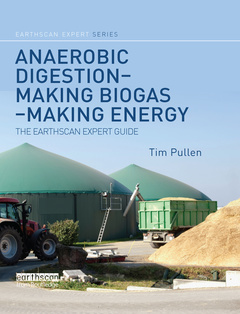Description
Anaerobic Digestion - Making Biogas - Making Energy
The Earthscan Expert Guide
Earthscan Expert Series
Author: Pullen Tim
Language: English
Subjects for Anaerobic Digestion - Making Biogas - Making Energy:
Keywords
anaerobic digestion; anaerobic; bioenergy; biogas; agricultural waste; food industry waste; digestate; AD plants; clean fertilisers; environmental entrepeneur; Es Ta; environmental leglislation; EU Renewable Energy Directive; CHP Unit; UK Environment Agency; UK Plant; UK Local Authority; Moisture Content; FGS; Ad Plant; Energy Source; Ad System; Ad; Count Alessandro Volta; Ad Operator; National Gas Network; Liquid Digestate; Solid Digestate; Central Government; Tipping Fee; Small Scale Scheme; Food Waste; Biogas Plant; Lodge Farm; UK Waste; UK Scheme
Publication date: 06-2020
· 18.9x24.6 cm · Paperback
Publication date: 01-2015
190 p. · 18.9x24.6 cm · Hardback
Description
/li>Contents
/li>Readership
/li>Biography
/li>
Hundreds of million tonnes of agricultural and food waste are produced each year around the world, most of which is just that, waste. Anaerobic digestion, biogas and the heat and electricity that can be produced from it is still a nascent industry in many countries, yet the benefits of AD spread throughout the community:
- Gives good financial returns to farmers and eco-entrepreneurs.
- Helps community leaders meet various policies and legislative targets.
- Offers an environmentally sensitive waste disposal option.
- Provides a local heat and power supply, & creates employment opportunities
- Reduces greenhouse gas emissions, as well as providing an organic fertilizer.
Although the process of AD itself is relatively simple there are several system options available to meet the demands of different feedstocks. This book describes, in simple, easy to read language the five common systems of AD; how they work, the impact of scale, the basic requirements, the costs and financial implications, and how to get involved in this rapidly growing green industry.
1. Introduction to Anaerobic Digestion and Biogas 2. A History of Anaerobic Digestion and Biogas 3. Digestor Feedstock/Substrate 4. Anaerobic Digestion Plant Types and Processes 5. Inputs and Outputs 6. Plant Scale 7. Anaerobic Digestion Plant Economics 8. Legislation, Permits and Regulations 9. Anaerobic Digestion and Local Communities 10. The Market for Digestate 11. Case Studies 12. Anaerobic Digestion around the World Glossary. Metric to Imperial Conversion Table. Sources of Further Information
Tim Pullen is a consultant at WeatherWorks Ltd, a company he established himself in 2004. WeatherWorks provides advice and guidance on sustainable building and renewable energy solutions to self-builders, developers and housing associations. In 1975, Tim built his own AD plant at his then home in Kent, using slurry from a neighbouring pig farm, igniting a passion that continues to this day. Tim is also an eco-expert for Homebuilding & Renovating magazine and has published books on sustainable building.




